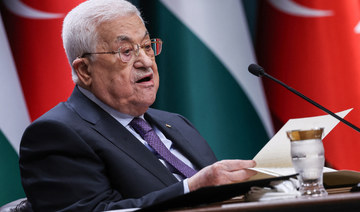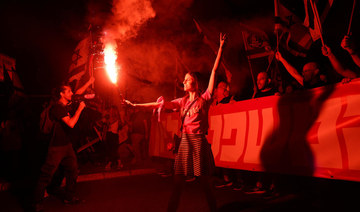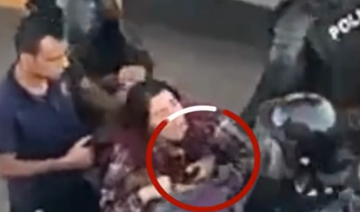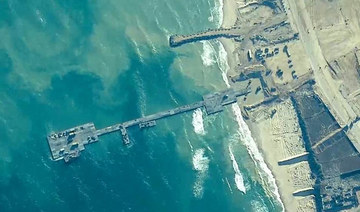ASA’EL, West Bank: With attention focused on its contentious judicial overhaul, Prime Minister Benjamin Netanyahu’s government has quietly taken unprecedented steps toward cementing Israel’s control over the West Bank — perhaps permanently.
Finance Minister Bezalel Smotrich, a leader of the settlement movement, assumed new powers over the occupied territory in his coalition agreement with Netanyahu. Smotrich moved swiftly to approve thousands of new settlement homes, legalize previously unauthorized wildcat outposts and make it more difficult for Palestinians to build homes and move about.
As the first government minister to oversee civilian life in the West Bank, his role amounts to a recognition that Israel’s 56-year military occupation is not temporary but permanent, observers say.
“If Smotrich keeps this position for four years we will be at a point of no return,” said Ilan Paz, former head of Israel’s Civil Administration, a military body overseeing civilian affairs in the West Bank.
Hoping to return to power while facing a corruption trial, Netanyahu offered sweeping concessions to pro-settler lawmakers like Smotrich to form his governing coalition last year. The coalition agreement created a new Israeli settler agency, led by Smotrich, within the Defense Ministry to manage Jewish and Palestinian construction in the 60 percent of the West Bank over which Israel has control.
“It’s a sort of revolution, transferring powers from the military, with its legal obligation to consider the well-being of occupied people, to those only committed to Israeli interests,” said human rights lawyer Michael Sfard.
Smotrich has said he seeks to double the settler population, build up roads and neighborhoods and erase any remaining differences between life for Israelis in the West Bank and within Israel proper. Along the way, he hopes to destroy any Palestinian hopes of independence.
As finance minister, Smotrich can funnel taxpayer funds to West Bank infrastructure projects. Israel’s 2024 budget earmarks an all-time high of $960 million — a quarter of all Transportation Ministry funds — for a highway network better connecting Israel to the West Bank. The settlers are just over 5 percent of Israel’s population.
Smotrich and his supporters see the West Bank as the biblical homeland of the Jewish people and envision a single state from the Jordan River to the Mediterranean Sea in which Palestinians can live quietly with second-class status or leave.
“We felt like the state never prioritized us because of where we lived. Smotrich is changing that,” said Smotrich’s spokesperson Eitan Fuld.
While Smotrich’s new settler agency now handles the territory’s land-use issues, COGAT, the military body that oversees the Civil Administration, retains specific responsibilities over more than 2 million Palestinians. Rights groups and others have compared the division along ethnic lines to ” apartheid.”
Some half-million settlers live in the West Bank, which Israel captured along with east Jerusalem and Gaza in the 1967 Mideast war. The international community overwhelmingly considers the settlements illegal.
Experts and officials say Smotrich’s policies already have compounded Palestinian misery, emboldened violent settlers and unleashed turmoil within Israel’s military establishment. Recent settlement expansion has also strained the Netanyahu government’s ties with the White House.
Smotrich declined interview requests.
“Smotrich took over the Civil Administration, the only tool that Israel has to calm things down,” said former West Bank military commander Gadi Shamni. “The West Bank will explode.”
Monthly settler attacks have surged by over 30 percent this year, compared to 2022, UN figures show. The government has approved 13,000 settlement housing units and legalized 20 outposts built without authorization, said anti-settlement watchdog Peace Now, the highest levels since the group started counting in 2012.
Under Smotrich, Israeli authorities have pressed on with the demolition of Palestinian construction built without permits. COGAT acknowledged in July that it rejects over 95 percent of Palestinian permit requests.
This year’s demolitions are up slightly from last year, which saw the most demolitions since at least 2006, according to Israeli rights group B’Tselem.
Meanwhile Israeli authorities have scaled back efforts to evacuate unauthorized Jewish outposts, settlers say.
“This is the best government we’ve ever had,” said 32-year-old Shulamit Ben Yashar from the outpost of Asa’el in the arid hills south of Hebron. The outpost — home to 90 families, including Smotrich’s brother Tuvia — received legal approval on Sept. 6.
Renovation fever ran high at the Asa’el playground as mothers gushed about their plans to swap ramshackle caravans and wheezing generators for concrete and Israel’s national electricity grid.
Their Palestinian neighbors — herders across dusty slopes known as Masafer Yatta — face expulsion by Israeli authorities and increased attacks by settlers. Residents in the rural area, which the Israeli military plans to seize, say Smotrich and his allies are squeezing the life from their communities.
“We can barely breathe,” said 38-year-old Sameer Hammdeh, whose two camels were killed last month after stumbling over trip wires he said were placed by settlers. Residents say settler provocations — damaging Palestinian cars and hurting livestock — reflect a sense of impunity instilled by the government.
Smotrich and his allies have also vowed to hasten the pace of settlement construction. In July, the government slashed six stages of approval required for settlement advancement down to two: Smotrich and a planning committee.
“This makes it possible to build much more,” said Zvi Yedidia Sukkot, lawmaker in Smotrich’s Religious Zionist party.
The party has proposed allocating $180 million to renovate settlement housing and build new hospitals and schools. Authorities are paving two new multimillion-dollar bypass roads to whisk Israeli settlers around Palestinian towns.
One of the roads goes around Hawara, a flashpoint town where settlers burned dozens of houses and cars in a rampage early this year following the deadly shooting of two settlers. At the time, Smotrich said the town should be “erased.”
“Our government has finally figured out that withdrawing from land is a prize for terror,” said Rabbi Menachem Ben Shachar, a teacher at a newly built yeshiva seminary at Homesh, one of four outposts that Israel evacuated in 2005.
Lawmakers repealed the legislation this year that had barred settlers from visiting the site. Over 50 students were rocking in prayer at the yeshiva on a recent visit.
Such decisions have unsettled Israel’s defense establishment. Settlers said that Israeli forces in May tried to stop them from hauling heavy construction equipment to build a new yeshiva. But when Smotrich pressed, the government abruptly ordered troops to allow settlers to build.
“The political echelon ordered the military echelon not to obey the law,” said Nitzan Alon, a retired general who once commanded the West Bank region.
The military and COGAT declined to comment on that incident. But a security official, speaking on condition of anonymity to discuss the matter, said Smotrich’s intervention has halted several planned demolitions in unauthorized outposts.
Last month, the tug-of-war between Smotrich stalwarts and security-minded military men burst into the open when Israeli authorities were filmed pumping cement into wells south of Hebron, permanently sealing Palestinian water sources in the heat of summer. Palestinians had drilled the wells without permits that Israel rarely provides.
The footage spread on social media, and COGAT was caught off-guard, said the security official. The agency promised any future demolitions of water cisterns “would be examined based on their merits.”
Smotrich’s men are “crossing all the lines,” said Paz, the former general. “They don’t care.”
Israel’s finance minister governs West Bank as critics see steps toward permanent control
https://arab.news/99wce
Israel’s finance minister governs West Bank as critics see steps toward permanent control
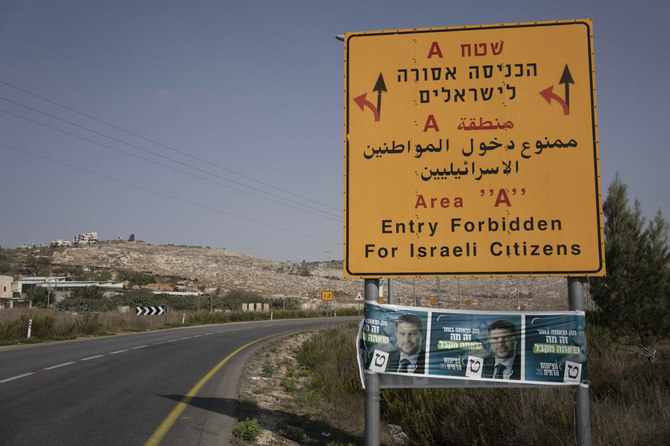
- Smotrich assumed new powers from the military over the occupied territory
- As the first minister to oversee civilian life in the West Bank, his role amounts to recognition that Israel's occupation is not temporary, but permanent
Iran arrests 3 Europeans at “Satanist” gathering along with 260 others, Tasnim says

- Those detained comprised 146 men and 115 women and that alcohol and psychedelic drugs were seized.
DUBAI: Iranian security forces have arrested more than 260 people, including three European nationals, at a “Satanist” gathering west of the capital Tehran, the semi-official new agency Tasnim reported on Friday.
“Satanist network broken up in Tehran, arrests of three European nationals,” Tasnim wrote, adding that those detained comprised 146 men and 115 women and that alcohol — banned under Iran’s Islamic laws — and psychedelic drugs were seized.
The report did not give the nationality of the Europeans.
Spain PM will Wednesday announce date to recognize Palestinian state

- Sanchez said in March that Spain and Ireland, along with Slovenia and Malta had agreed to take the first steps toward recognition of a Palestinian state
MADRID: Spanish Prime Minister Pedro Sanchez said Friday he will on Wednesday announce the date on which Madrid will recognize a Palestinian state along with other nations.
“We are in the process of coordinating with other countries,” he said during an interview with private Spanish television station La Sexta when asked if this step would be taken on Tuesday as announced by EU foreign policy chief Josep Borrell.
Sanchez said in March that Spain and Ireland, along with Slovenia and Malta had agreed to take the first steps toward recognition of a Palestinian state alongside Israel, seeing a two-state solution as essential for lasting peace.
Borrell told Spanish public radio last week that Spain, Ireland and Slovenia planned to symbolically recognize a Palestinian state on May 21, saying he had been given this date by Spanish Foreign Minister Jose Manuel Albares.
Ireland’s Foreign Minister Micheal Martin said Tuesday that Dublin was certain to recognize Palestinian statehood by the end of the month but the “specific date is still fluid.”
So far, 137 of the 193 UN member states have recognized a Palestinian state, according to figures provided by the West Bank-based Palestinian Authority.
Despite the growing number of EU countries in favor of such a move, neither France nor Germany support the idea. Western powers have long argued such recognition should only happen as part of a negotiated peace with Israel.
Israel army says civilians torched Gaza-bound aid truck in West Bank

- Driver as well as Israel soldiers were injured in the attack
JERUSALEM: Israel’s military said Friday that “dozens of Israeli civilians” set fire the previous evening to an aid truck in the occupied West Bank headed for war-torn Gaza.
Local media reported that Israeli settlers were behind the attack, which the army said injured the driver as well as Israeli soldiers.
The incident took place near Kokhav Hashahar, an Israeli settlement in the central West Bank, a territory occupied by Israel since 1967.
According to the army, Israeli soldiers intervened to “separate the Israeli civilians from the attacked Israeli driver” and provided medical assistance.
The group then “responded with violence,” and three Israeli soldiers were “lightly injured,” the army said, condemning “all forms of violence against its soldiers and security forces.”
On Monday, dozens of people blocked and vandalized a convoy of aid trucks driving to the Gaza Strip.
Israeli media identified them as part of a far-right group opposed to allowing aid into Gaza.
The trucks were attacked in Israel, shortly after passing through the Tarqumiya checkpoint from the West Bank.
Images posted on social media show Israeli soldiers watching on as the attackers destroy the aid.
The latest incident comes just hours after the army said on Thursday that the Tarqumia and Beitunia checkpoints “now also function as inspection points for aid” destined for Gaza.
Jordanian authorities said “Israeli extremists” in the West Bank attacked two aid convoys sent on May 1 from Jordan and another convoy of 35 trucks sent on May 7.
Israel has been fighting their bloodiest war ever in Gaza since the Palestinian militants attacked Israel on October 7.
Despite the United Nations warning of looming famine, Israeli authorities have tightly controlled much needed humanitarian aid into Gaza over the course of more than seven months of war.
Very little aid has made it through Kerem Shalom crossing in southern Gaza, and Rafah crossing has been completely shut since Israeli troops took control of the area last week.
Israel has vowed to defeat remaining Hamas forces in the southern city of Rafah, which it says is the last bastion of the group whose October 7 attack triggered the war.
The Hamas attack on southern Israel resulted in the deaths of more than 1,170 people, mostly civilians, according to an AFP tally based on official Israeli figures.
More than 35,303 Palestinians, mostly civilians, have been killed in Gaza since the war broke out, according to data provided by the health ministry in the Hamas-run territory.
Saudi Arabia, UAE ‘the locomotives of the region’ says French trade commissioner

- Vision Golfe returns for a second edition June 4-5 at the French Ministry of Economy in Paris
- The benchmark event between France and the Gulf countries aims to promote trade and economic relations
DUBAI: After the success of its first edition, Vision Golfe returns for a second edition June 4-5 at the Ministry of Economy, Finance, Industry and Industrial and Digital Sovereignty in Paris.
The benchmark event between France and the Gulf Cooperation Council countries aims to promote trade and economic relations, building on a long-standing relationship between France and the GCC states, particularly between France and Saudi Arabia.
“Between France and the GCC countries … we have a long story of friendship. We build bridges together based on mutual comprehension, respect, mutual interest, ambition, and our political bilateral relation is absolutely at the top,” said Axel Baroux, trade and invest commissioner of Business France Middle East, in an interview with Arab News in French.
“We have a great and solid commercial and investment relationship, but I think that we can do even more,” he added.
Vision Golfe is a platform to promote business cooperation in markets with high growth potential, and an opportunity to meet key economic players: ministers, start-ups, and senior executives, among others.
“Vision Golfe is a tool, the starting point for negotiations and discussions. Discussions continue throughout the year … our trade and investment grew last year by almost 8 percent,” declared Baroux.
“If I take the figures of the GCC investment in France, we are reaching €14 billion ($15.178 billion) which is exactly €13.7 billion,” he added, while pointing out that the figure is underestimated for not considering indirect investments.
Despite the challenges facing the global economy, Gulf countries continue to offer an environment conducive to investment and talent attraction, leveraging national policies focused on economic diversification, sustainable development, and energy transition.This creates a favourable atmosphere for the establishment of companies in various sectors such as energy and new technologies, as well as sectors such as healthcare, education, retail, and tourism.
As the two largest markets in a region marked by considerable growth in trade, Saudi Arabia and the UAE are today “the locomotives of the region,” Baroux says.
This explains the rise in French companies setting up operations and participating in major projects and trade in the Gulf.
Baroux highlighted his participation in a delegation of French companies in Saudi Arabia, with over 120 companies taking part in the event organized by Business France and the MEDEF, in the presence of the director general of Business France, Laurent Saint Martin, French foreign trade advisors, and Bruno Bonnell, the secretary-general for Investment FRANCE 2030.
“We were admirably received. Agreements were signed with STC and Business France. We also visited the PIF, and had discussions with MISA,” he added.
The UAE also offers opportunities for French companies across sectors, with “more than 600 French companies on ground … Translating into direct employment, projects and a solid economic relationship,” according to Baroux.
“We have very strong, very solid bilateral economic relations between France and the GCC and it is a reason why we expect Vision Golfe to be the annual rendez-vous, the annual meeting, where all the companies from the GCC and from France can meet together in Paris,” he added.
HIGHLIGHTS
It aims to present success stories of major partnerships that contribute to the strategies of Gulf countries.
The program includes an opening speach by Business France CEO Laurent Saint Martin, in the presence of ministers from France and the GCC, and a panel addressing “The Gulf at the crossroads of Asia and Europe” to kick off two days of panels and meetings.
Thematic and sector-specific discussions and round tables are on the agenda, with topics including but not limited to:
• Converging national strategies
• Building sustainable partnerships
• How to invest and set up a business in the Gulf
• Energy for the future: sustainable energy and resource management after COP28
• Cooperation and investment opportunities in various sectors
• France as Europe’s most attractive destination for foreign direct investment
Economic diversification, innovation, artificial intelligence, infrastructure, and transport development are among the themes addressed during the second edition.
The French touch and know-how will also be in the spotlight, in the presence of a number of guests and speakers, such as Jean Yves LeDrian, chair of the French Agency for the Development of AlUla, the CEO of NIDLP Suliman Almazroua, the secretary-general of the UAE International Investors Council, Jamal Saif Al-Jarwan, with the participation of the Abu Dhabi Investment Office, Mohamed Bin Zayed University, and Kuwaiti and Qatari groups to state a few.
“Vision Golfe 2023 was a real success, and of course, I expect more for Vision Golfe 2024. More B2B meetings, more partnerships, even more interaction between French companies and GCC companies. We will have this year at Vision Golfe 2024 some key agreements that will be signed, during the session,” said Baroux.
Aid groups warn of mounting challenges to Gaza operations

- The latest fighting, more than seven months into the war, has cut off access to some areas and left aid crossings either closed or operating at a limited capacity
Jerusalem: Humanitarian workers already face a slew of challenges getting aid to civilians in the besieged Gaza Strip, and fear that as the Israel-Hamas war rages on they may be forced to halt operations.
“There are enormous needs” which are bound to grow, while there is “less and less access”, said the head of a European charity, speaking to AFP on condition of anonymity.
Aid groups say the humanitarian crisis in the war-ravaged Palestinian territory, where the UN has warned of looming famine, has significantly deteriorated since Israeli troops entered eastern Rafah last week.
The Israeli military has launched what it called a “limited” operation, seizing on May 7 the Rafah crossing on the Egyptian border — a key aid conduit that is now shut — and sparking an exodus of Palestinians seeking safety further north in Gaza.
The latest fighting, more than seven months into the war, has cut off access to some areas and left aid crossings either closed or operating at a limited capacity.
A worker for the Paris-based non-governmental organization Humanity & Inclusion (HI) in the Palestinian territories, also requesting anonymity, said: “We can’t get our teams out, the security conditions are too unstable.”
Israel has vowed to defeat remaining Hamas forces in the southern city of Rafah, which it says is the last bastion of the group whose October 7 attack triggered the war.
The attack on southern Israel resulted in the deaths of more than 1,170 people, mostly civilians, according to an AFP tally based on official Israeli figures.
Israel’s campaign in Gaza has since killed at least 35,303 people, also mostly civilians, according to data provided by the health ministry in the Hamas-run territory.
Aid workers told AFP their organizations had regularly been denied access by Israeli authorities to certain areas or routes.
The Kerem Shalom crossing between Israel and southern Gaza has reopened following a brief closure, but humanitarian groups say Israeli tanks amassing there and repeated Hamas rocket fire have hindered operations.
A trickle of aid has entered via Kerem Shalom in recent days under “great risk, through an area of active hostilities,” said a UN employee in Jerusalem.
Human Rights Watch charged this week that Israeli forces had repeatedly targeted known aid worker locations, even when their organizations had provided the coordinates to Israeli authorities to ensure their protection.
On Monday a UN employee was killed and another wounded when their vehicle was hit in Rafah.
Shaina Low, communications adviser for the Norwegian Refugee Council, said the organization had subsequently “canceled all of our movements for the rest of the day to mitigate risk to our staff.”
The Israeli army said it was looking into the incident which occurred “in an area declared an active combat zone.”
Since the war began, more than 250 humanitarian workers have been killed in Gaza, according to UN figures.
Aid workers complain of lengthy and convoluted procedures to coordinate their movements with the Israeli military via the United Nations and several Israeli agencies.
“We are seeing mishaps” even after COGAT, the Israeli defense ministry body overseeing civilian affairs in the occupied Palestinian territories, informs organizations they have clearance, said Tania Hary, head of Israeli rights group Gisha.
“It does point to something that’s going wrong in the communication” between COGAT and the army, she said.
To avoid having to go through a series of mediators — UN agencies, Israel’s Coordination and Liaison Administration and then its parent agency COGAT — some aid groups have opted for direct contact with Israeli military authorities.
But workers and officials told AFP this has mostly created further confusion. Some also fear NGOs would accept conditions in direct communication with the military, which could set precedents other groups may not be willing to abide by.
The HI employee said: “Notifying them of our movements, which they’re not supposed to hinder, is a way of reminding them of their accountability if anything goes wrong.”
Humanitarian workers stress that Israel, as an occupying power, is required under international law to ensure aid reaches civilians in Gaza.
A military spokesperson said Thursday the army was in contact with international organizations “in real time” and ensuring “the best way possible to communicate as fast as possible.”
Even if a full-scale invasion of Rafah is averted, humanitarian agencies say conditions are unsustainable.
Debris and destruction have rendered main routes and many other roads impassable, and a severe fuel shortage — worsened since the Rafah crossing takeover — has limited the use of vehicles.
“We’re only going to places we can walk to,” said the head of one aid group with about 50 workers in Gaza.
A Jerusalem-based humanitarian official, also speaking on condition of anonymity, said he recognized that “military imperatives” arise in conflicts and may limit aid operations.
But in the Gaza war, movement requests are denied too often and “we can hardly bring anything,” he said.
“We can’t work like this.”



